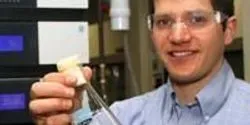News

A growing partnership between the University of Michigan and a company in Dexter is a model for how university-to-business ties can produce significant mutual benefits.

Treating cadmium-telluride (CdTe) solar cell materials with cadmium-chloride improves their efficiency, but researchers have not fully understood why. Now, an atomic-scale examination of the thin-film solar cells led by the Department of Energy’s Oak Ridge National Laboratory has answered this decades-long debate about the materials’ photovoltaic efficiency increase after treatment.

Agriculture Secretary Tom Vilsack announced Apr. 22 that USDA's National Institute of Food and Agriculture (NIFA) awarded $6 million to 10 universities to study the effects of climate on agriculture production and develop strategies to provide farmers and ranchers with the solutions they need to supply the nation with quality food.

A University of Adelaide mineralogy researcher has discovered a new mineral that is unique in structure and composition among the world's 4,000 known mineral species.

Arduous, year-plus-long scrutiny by the National Science Foundation (NSF) has found the Cornell High Energy Synchrotron Source (CHESS) rich in scientific discovery and exemplary in its use of government funds. CHESS has received its requested grant renewal of up to $100 million over five years, securing the national X-ray facility’s near-term future

A new study in the Journal of Food Science, published by the Institute of Food Technologists (IFT), found that common edible flowers in China are rich in phenolics and have excellent antioxidant capacity. Edible flowers, which have been used in the culinary arts in China for centuries, are receiving renewed interest. Flowers can be used as an essential ingredient in a recipe, provide seasoning to a dish, or simply be used as a garnish. Some of these flowers contain phenolics that have been correlated with anti-inflammatory activity and a reduced risk of cardiovascular disease and certain cancers.














